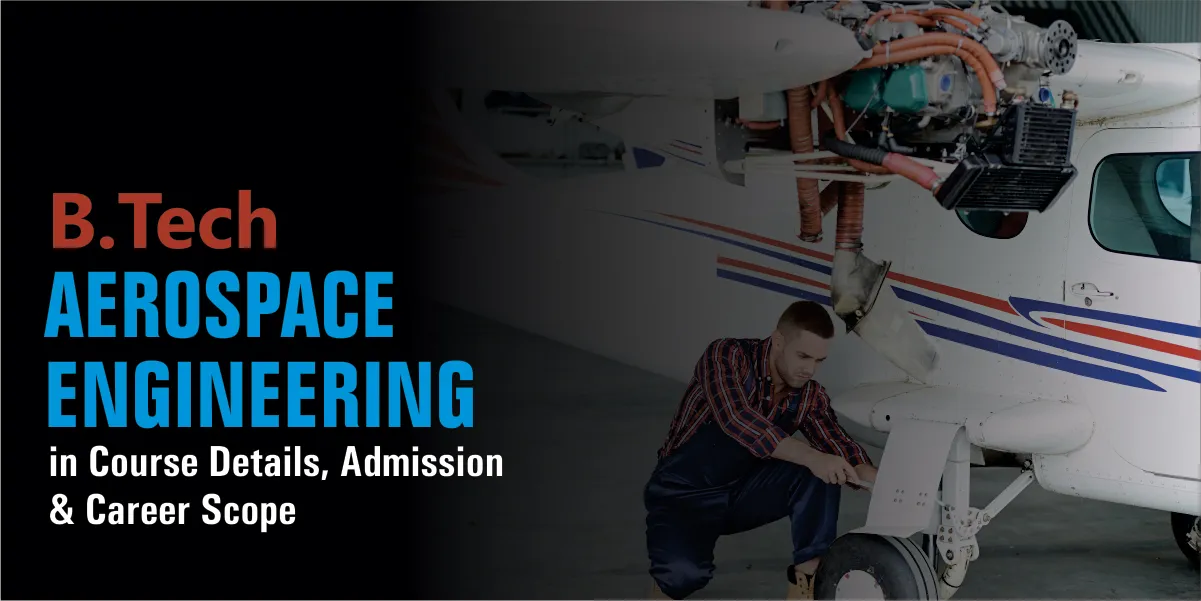
30, Nov. 2024
Aerospace engineering, a fascinating blend of science and innovation, is the backbone of the aviation and space exploration industries. A B.Tech in Aerospace Engineering equips students with the skills to design, develop, and maintain aircraft, spacecraft, and related technologies. The field’s relevance continues to grow, making it a sought-after discipline for young aspirants passionate about technology and the skies.
What is B.Tech Aerospace Engineering?
B.Tech in Aerospace Engineering is a four-year undergraduate degree that combines principles of physics, mathematics, and engineering to address challenges in aviation and space exploration. This course covers aerodynamics, propulsion, avionics, and materials science, preparing students for dynamic roles in both research and industry.
Eligibility Criteria for Admission
- Academic Requirements - Candidates must have completed their 10+2 education with Physics, Chemistry, and Mathematics as core subjects. A minimum percentage (typically 50-60%) is required, though this may vary by institution.
- Entrance Exams - Admission is primarily through entrance exams like JEE Main, JEE Advanced, or state-level engineering tests. Private institutions may also conduct their own exams.
- Minimum Age Criteria - Most colleges require students to be at least 17 years old at the time of admission.
Admission Process
- Application Procedures - Applications can be submitted online through the respective college or exam portal. Ensure all required documents, such as mark sheets and identity proofs, are uploaded.
- Entrance Exams and Cut-Off Scores - Clearing the required entrance exam with a good rank is crucial. The cut-off scores vary yearly based on exam difficulty and the number of applicants.
- Selection and Counseling - Qualified candidates are invited for counseling sessions where they can choose their preferred institution based on their ranks.
Top Institutes Offering B.Tech in Aerospace Engineering
Renowned Colleges in India
- Indian Institute of Technology (IIT) Bombay
- IIT Madras
- Indian Institute of Space Science and Technology (IIST)
- Hindustan Institute of Technology and Science
Global Institutions Leading in Aerospace Studies
- Massachusetts Institute of Technology (MIT), USA
- Stanford University, USA
- University of Cambridge, UK
- Delft University of Technology, Netherlands
Key Subjects and Curriculum Structure
Core Subjects
- Aerodynamics
- Propulsion Systems
- Avionics and Navigation
- Flight Mechanics
Electives and Specializations
- Spacecraft Design
- Unmanned Aerial Vehicles (UAVs)
- Satellite Communication
Practical and Lab Work
Students gain hands-on experience through wind tunnel testing, CAD simulations, and internships.
Skills Gained in Aerospace Engineering
- Technical Skills: Expertise in aerodynamics, propulsion, and system designs.
- Soft Skills: Communication, teamwork, and problem-solving abilities.
- Industry Knowledge: Understanding real-world aerospace challenges.
Scope of Aerospace Engineering
- Career Opportunities - Aerospace engineers work in diverse fields, including aviation, space exploration, and defense.
- Research and Development - Many graduates contribute to R&D projects, innovating new technologies for sustainable aviation and advanced spacecraft.
- Global Demand - With the space race intensifying, the demand for skilled aerospace engineers has soared worldwide.
Job Roles and Industries
Aeronautical Engineer vs. Astronautically Engineer
- Aeronautical Engineers focus on aircraft within Earth's atmosphere.
- Astronautically Engineers deal with spacecraft and extraterrestrial
technologies.
Industries
- Aerospace manufacturing
- Space research organizations like ISRO and NASA
- Defense contractors like Boeing and Lockheed Martin
Salary Expectations
- Entry-Level Salaries - Fresh graduates can expect starting packages of
₹4–8 LPA in India.
- Mid-Level and Senior Positions - Experienced professionals earn
₹10–30 LPA or more, depending on the role and organization.
- International Salary Standards - Globally, aerospace engineers earn an
average of $85,000–$120,000 annually.
Higher Studies and Specializations
- Tech and Ph.D. in Aerospace Engineering - Postgraduate studies allow
students to delve deeper into specializations like aerodynamics or propulsion systems.
- Other Related Fields of Study - Options include robotics, mechatronics, or
artificial intelligence applications in aerospace.
- International Education - Top universities abroad offer cutting-edge
facilities for advanced research.
Challenges in Aerospace Engineering
- Competitive Nature - Securing admissions and jobs in aerospace engineering
is highly competitive.
- Complex Projects - Engineers face challenges in designing efficient and
sustainable technologies.
- Keeping Up with Technology - Continuous learning is essential to stay
updated with evolving aerospace trends.
Future Trends in Aerospace Engineering
- Sustainable Aviation - The industry is exploring hydrogen-powered planes
and electric aircraft.
- Space Tourism - Companies like SpaceX are making space travel accessible
for civilians.
- Satellite Technologies - Advanced satellite systems are revolutionizing
communication and Earth observation.
Why Choose B.Tech in Aerospace Engineering?
If you’re fascinated by flight or dream of exploring the cosmos, this course is for you. The field offers immense opportunities for innovation and significant societal impact. Plus, it’s a career path with long-term stability and growth.
Conclusion
B.Tech in Aerospace Engineering is a gateway to exciting career opportunities in aviation and space. From designing revolutionary aircraft to contributing to space exploration, the possibilities are endless. With the right skills and determination, you can soar to new heights in this dynamic field.
FAQs
- Is Aerospace Engineering a good career choice?
Absolutely! It offers diverse career paths and excellent growth potential. - What skills are necessary for success in aerospace engineering?
Strong analytical skills, problem-solving, teamwork, and a passion for innovation are vital. - Can I work in space research organizations with this degree?
Yes, graduates often join organizations like ISRO, NASA, or ESA. - What is the difference between aeronautical and astronautical
engineering?
Aeronautical engineering focuses on in-atmosphere flight, while astronautical engineering deals with space technologies. - Are there scholarships available for this course?
Many institutions and government bodies offer scholarships based on merit and financial need.